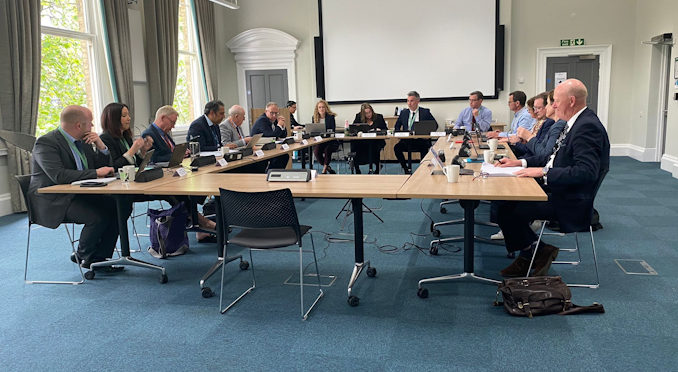
The politically polarised leadership of a new combined authority for York and North Yorkshire have voiced harmony at the first meeting with an elected mayor at the helm.
Conservative leaders of North Yorkshire Council and the Labour leadership of City of York Council and Labour mayor David Skaith appeared to agree on every point as they approved a budget of £2.21m for “priorities” that Mr Skaith had set out in his election manifesto.
Among the first decisions the five-person decision-making committee approved an allowance of £68,670 for Jo Coles, a Labour councillor in York, after Mr Skaith selected her to become deputy mayor for policing, fire and crime.
Outlining the initial spending plans, James Farrar, the combined authority’s interim chief officer, said the region’s route map to carbon negative, which set emissions-cutting goals to 2040 and was approved less than two years ago, had become “out of date”.
He said £100,000 would be spent re-engaging with stakeholders across the region and update its evidence base to produce “a series of investable propositions”.
Some £260,000 would be spent on examining ways to tackle cost of living issues and to make it a consideration in everything the combined authority does, Mr Farrar said.
The meeting heard as “great places in our high streets and in our towns” was at the heart of David Skaith’s mayoral manifesto the combined authority would invest £1.55m to ensure there was a plan for every town in the region.
Similar work would be undertaken over public transport, Mr Farrar said, “to ensure we have got affordable transport across the system”, which would be aimed towards “spending the £379m local transport fund in an ambitious but focused way”.
He said while the combined authority already had £12.7m to develop housing on brownfield sites, decarbonising housing was also a major priority, £50,000 would be spent examining how retrofitting homes with green measures could be accelerated.
Without being specific, Mr Farrar said numerous opportunities to innovate had been identified and the authority was working with national agency Innovate UK to develop a strategy, which would cost the mayoral fund £50,000.
He said: “It will put us in a really strong position as a combined authority, not just with a set of priorities, but with a set of very investable propositions that we can deliver on over the next few years.”
North Yorkshire Council leader Councillor Carl Les said while it had been pleasing to land the devolution deal with the Government, the initial meetings of the combined authority before the mayoral election had been frustrating as they had involved “putting the building blocks into place”.
He added: “Now we have got some flesh coming onto the bones.”
His deputy, Councillor Gareth Dadd said there had been “a void” before the mayor was elected and although Mr Skaith represented a different party, the way he had conducted his business so far had been “very embracing”.
He asked Mr Skaith about the importance he gave to “tangible outcomes” to the spending and if he would be flexible with his budget, if for example the cost of living officer did not produce results.
The mayor replied he wanted there to be open and honest conversations, to make flexibility a strength of the combined authority and for York and North Yorkshire to develop their joint working.
He said: “We are all in this together and we all want to see the positive outcomes.”
Following concerns being repeatedly raised that the combined authority would focus investment on York and overlook North Yorkshire’s vast rural area, City of York Council leader Councillor Claire Douglas told the meeting all of the spending priorities were “very much for the region”.
Coun Douglas said the investment in plans for towns would benefit “every corner of North Yorkshire”.
She said: “It’s been incredibly important to all of us that everybody in the region feels attached to the combined authority…”


Be the first to comment